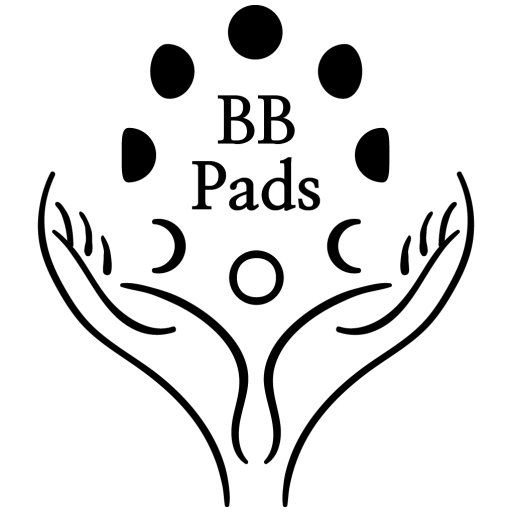Nature-positive production lies at the heart of what we do and stand for. We strive to ensure that the raw materials we use are non-depleting and non-destructive to the environment as well as being kind to your body. Our bloody brilliant pads are proudly plastic and harmful chemical free.
Unlike conventional, disposable pads which can be made of up to 90% plastic and contain traces of toxic chemicals, synthetic fragrances and adhesives, our pads consist of carefully selected layers of sustainable, environmentally-friendly fabrics, each with specific qualities which make them perfect for their role in period pads.
From the growing to the processing, weaving, finishing and knitting of our fabrics, no nasty chemicals are used and the fibres are ethically and sustainably sourced.
We do not use fabrics such as polyester, nylon or acrylic, as each time that these are washed (which your pads frequently will be) they release thousands of microplastics into the water.
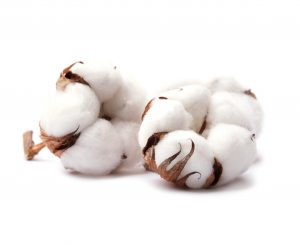
The inner layer of every pad is made from exceedingly soft 100% GOTS certified organic cotton. This layer also has specially designed contour stitching to guide the blood towards the most absorbent central core of the pad.
It is unbleached and undyed, meaning that there are absolutely no harmful toxins or chemicals coming into contact with your skin in this sensitive area.
Compared with conventionally produced cotton, organic cotton emits 46% less greenhouse gas and requires up to 91% less water to produce. Organic cotton farmers use natural methods like crop rotation instead of hazardous synthetic pesticides and fertilisers which can damage ecosystems, poison waterways, and endanger workers who often cannot afford safety equipment needed to protect them.
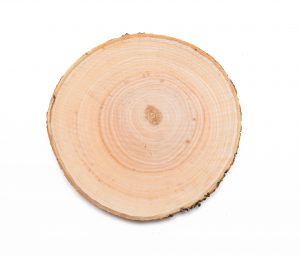
Next we have a layer of blended TENCEL™ and organic cotton. Sustainably sourced beech wood pulp is what makes the incredible TENCEL™ fabric.
It is one of the most environmentally-friendly regenerated fabrics you can get your hands on. The processing of the cellulose fibres uses closed-loop technology, meaning that the non-toxic solvents are recycled with a recovery rate of 99.5% so there is minimal waste and minimal impact on the environment.
This fabric is soft, strong, breathable, anti-bacterial, deodorising and can be up to 50% more absorbent than cotton. Perfect for periods.
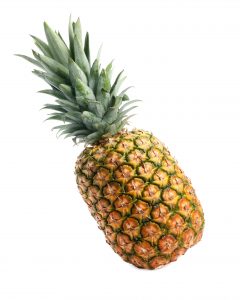
Thailand is the 7th largest pineapple producer in the world: producing almost 1.7 million metric tonnes of the fruit each year.
Usually, only the pineapple fruit is harvested and the leaves become waste. Farmers are able to boost their incomes by selling their “waste” which our textile suppliers then salvage and weave the fibres with cotton to create a beautiful layer of fabric, enriched with anti-bacterial and moisture-management qualities.
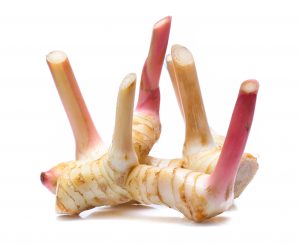
Galangal is indigenous to Southeast Asia and is a staple in Thai cuisine. It is the special ingredient in Tom Yum soup that gives it its spectacular and unique taste and fragrance.
Galangal fibres, which would otherwise be chucked away, are gathered from the plant’s stem and we incorporate them into the textiles we use.
When ingested, the root can serve as an anti-inflammatory and analgesic, it’s also rich in antioxidants which fight disease and protect your cells from free radicals. In fabric, this wonder plant helps prevent the growth of funghi and bacteria.
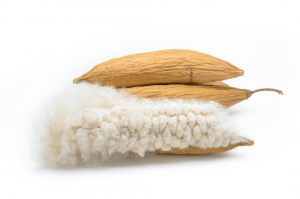 Kapok fibres come from the fluffy seed pods of the kapok tree which can live for around 300 years. It is a sustainable crop as it does not need to be replanted every year and requires no artificial pesticides, fertilisers or irrigation.
Kapok fibres come from the fluffy seed pods of the kapok tree which can live for around 300 years. It is a sustainable crop as it does not need to be replanted every year and requires no artificial pesticides, fertilisers or irrigation.
Kapok fibres are hydrophobic, meaning that they can support as much as 30 times their own weight in water. For this reason, we’ve put a layer of kapok fabric as the penultimate layer in each pad as well as the lining of the bags to help prevent leakage.
These fibres are also extremely light-weight, hypoallergenic and mould resistant.
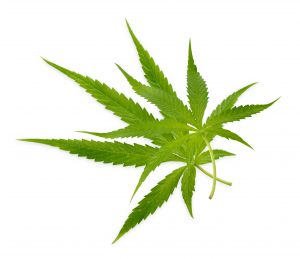
Hemp requires no pesticides or fertilisers to grow as it is naturally pest resistant (this makes it excellent for people with sensitive skin) and it requires half the farmland of cotton. It also needs very little water. It naturally replenishes 60-70% of the nutrients it draws up from the soil, its deep roots prevent erosion which helps to tackle flooding and surface run-off and this magnificent plant can renew up to three times per year.
Woven into a fabric it is known for its durability, absorbency, breathability and resistance to mould. It gets softer with time but will last for years.
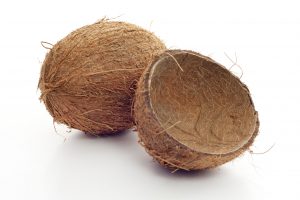
Thailand has an insatiable appetite for coconuts: in curries, sweets, ice-cream, cosmetics, you name it. It is also one of the world’s largest producers and exporters of coconut milk. With this vast demand, also comes a very large number of “wasted” coconut shells.
Each and every BB pad has a button fastening made from coconut shell. This provides additional income for farmers, reduces waste and means that when the pads do eventually reach the end of their lives these pretty and sturdy little buttons will break down nicely into healthy soil.
We can also confirm that the picking process used to collect the coconuts used for these buttons does not exploit monkeys as can sometimes sadly still be the case in some areas of southern Thailand.
At BB Pads, we believe that as a society, we urgently need to rethink how we use our resources and transition from a “linear economy” (make, use, dispose) to a “circular” one.
In a circular economy:
○ Resources are kept in use for as long as possible ○
○ The maximum value is extracted from them whilst in use ○
○ At the end of a product’s life the constituent parts are repurposed or safely fed back into nature ○
The global textile industry is one of the largest polluters in the world in the world which is having a catastrophic impact on the environment. The chemicals used to grow, process and dye fabrics along with the disposal of them are polluting water systems, soil and air at a devastating rate.
The industry is responsible for around 8-10% of global carbon emissions – more than all flights and maritime shipping combined, generates 92 million tonnes of waste per year and consumes 79 trillion litres of water.
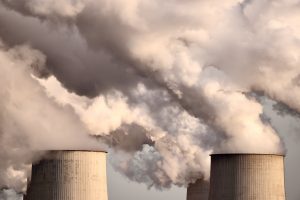
The demand for conventional textiles is only increasing, yet we cannot afford to continue on this trajectory.
Not only do all our materials require minimal water and energy to produce as well as no fertilisers or pesticides, but they are biodegradable and home-compostable.
People often get “biodegradable” and “compostable” mixed up, but they do not mean the same thing. A biodegradable product may be broken down by microorganisms but this does not necessarily mean that the product can be converted into good quality soil.
There’s also a difference between whether a product is compostable under “home” or “industrial” conditions.
To be honest it’s all quite confusing and the legislation in the UK around what classifies as “home-compostable” can be a little unclear BUT, it would appear that the most widely accepted definition of “home-compostable” is that the product must biodegrade by at least 90% of the product mass under a temperature of 58°C (+/- 2°C) within six months.
We don’t have an official “home-compostability” certification just yet, but you can check out our Instagram page to see our home-compostability experiment for now!
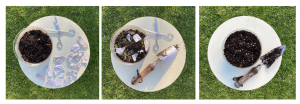
When biodegradable/organic matter gets sent to the landfill, the anaerobic environment results in it releasing methane which has a global warming potential 84x greater than CO2 in a 20 year time frame.
So, when your pads do reach the end of their lives we recommend that you simply shove them in with your compost waste (helps if you cut it up a bit) and let the worms do the rest. They will not leave behind any toxic residues that can come from chemical dyes or fibre-processing treatments.
